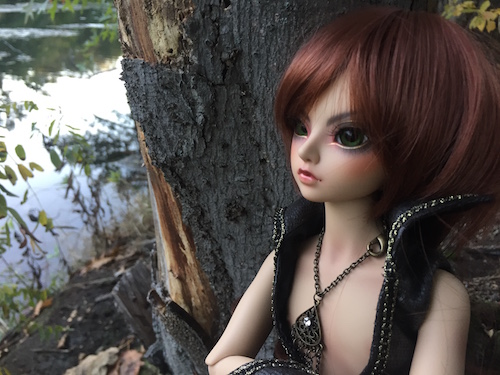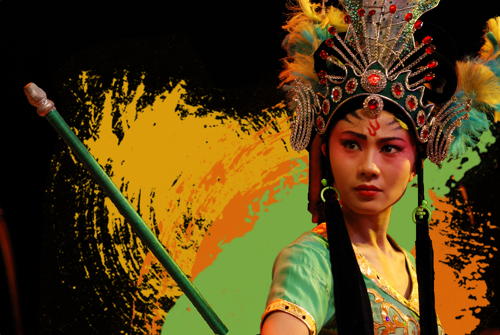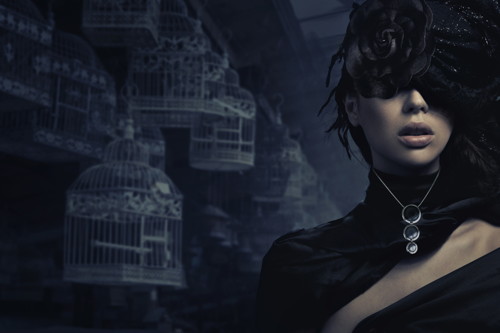Background
What people know about the gods is not always true.
In one village, it is known that Maska, the evil Wolf Lord, tries endlessly to kill Elita the Monarch Deer, protector of the world and kind benefactor to its people. In another, Maska is a trickster who pulls people away from those they love, while Elita teaches them the stories of togetherness and support. In still others, Maska is a dangerous hero, he who would face the armies of the Fair Folk while peaceful but frightened Elita runs away to hide. People simplify the world, and project their own feelings onto the gods, and remember jokes that their grandmother told them as if they were truth.
In truth, Elita and Maska are brother and sister. Yes, they fought from time to time, as any siblings would, but they worked together to protect their people and teach them to survive as best they could. Was Maska a bit of a joker? Was Elita too cautious for her own good? Maska tells it that way, at least – but they were family, and they loved one another.
It came as painful news to Maska, then, that Elita lay injured in the forest. A sparrow-spirit told him, and he rushed to her side as the blood dripped from her. Maska saw that Elita was weakened and needed every scrap of power she could get. He also knew that Elita shared her power with her priests. Taking Boral as a priestess, as was destined the next day, would cost her dearly. The only way Maska saw to prevent Elita’s death was to take Boral as his own priestess. Elita passed her debt to Maska, and he fainted from the strain.
When he woke up, Elita was gone. Maska sought her, but could not find her, not in the heavenly city nor in the woods of his people. He sought out Boral, but she rejected him as a tormentor and adversary. He eventually found Ishowo and her people, and joined them to defend the villages of the Glen, on the condition that they would help him find the deer goddess when all was done. He would prefer to seek Elita out on his own, but knows that Boral is his responsibility too. He is too stubborn to leave her on her own.
Appearance
Maska wears very dramatic clothing: black, high-collared robes that flare around his wolf feet, dark necklaces with large stones, blush for his cheeks and kohl for his large green eyes. People often don’t notice his wolflike hands and feet. His hair is brown with reddish tones. His skin is pale white, and he wears his robes open to emphasize his bare chest.
Demeanor
Boisterous, funny, often sarcastic, Maska is a natural leader. He tried to take leadership of the group by downplaying Ishowo’s skills, and found himself instantly put straight by everyone around him. Ishowo has overlooked his previous asinine behavior because she needs Maska’s initiative and drive right now. She can’t trust Mari the coward or Sia the opportunist to train these villagers. Koyo isn’t bright enough, Margery isn’t strong enough, Ramia’s too nervous and Ivy’s too alien. Ishowo delegates some leadership to Maska because he’s the only one for the job. He’s not used to being trusted – who gives a wolf a job? – but something within him wants to step up to any challenge.
He’s also conflicted. His instincts tell him two different things at once. Save my priestess. Save my sister. Teach these people. Test these people. Life is all a joke. This is all deadly serious. I am just a toy. I am a god. Sometimes he’s even more lost than Boral is. Of course, most of that is his own fault, and he finds that bitterly funny as well.
More than anything, Maska is stubborn. Once he decides that something needs to be done, he’ll try one thing after another to get it done. This tenacity can make him predictable and easily manipulated, but like most trickster gods, he doesn’t take lightly to people manipulating him. It’s bad for the rep.
Intimacies: My sister Elita must be found (defining), Teach my people (defining), You can’t tell me what to do (major), Boral is my responsibility now (major), Everyone needs to loosen up.
Capabilities
As a wolf, Maska is a natural pack hunter. He’ll circle around to strike from behind, nip to distract, grab axe hafts and run away with them, distract people when they’re about to be shot. As much as he’s a diva at home, in combat he’s the ultimate team player.
Maska has a great deal of natural charisma. The villagers enjoy hanging out with him in the chilly evenings as he tells stories around a campfire. He can’t command the instant attention that Ishowo or Margery can, but he forms strong bonds quickly.
Though he is a god, and technically a spirit, Maska lives most of his life in physical form. He loves the feeling of the wind on his face and the ground beneath his feet too much to live as pure spirit. He can still dematerialize, but it takes him great effort.
Maska is particularly good at reading people: knowing what their limits are, what the best way is to approach them, how to get them to trust him.
Supporting Characters
- Reto Wolfhand, his distant priest. Animated, professional, philanthropic.
- Enily Rosemaryhand, a would-be worshipper here in the valley. Fretful, alert, goal-oriented.
- Kewin Herdhand, who doesn’t trust Maska. Petty, forceful, pretentious.
- Petros Trapperschild, a young child who calls Maska “Puppy!” Loud, fearless, energetic.
Questions
- What do other gods and spirits think of Maska?
- Is he really a god, or does he just think he is?









